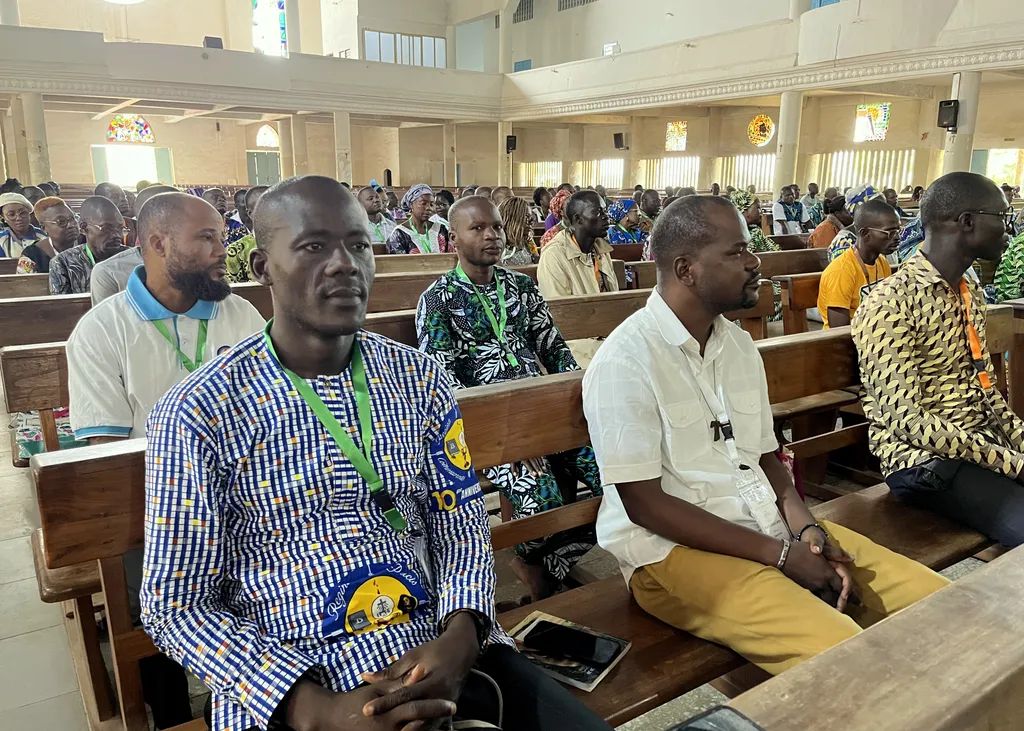
Support La Croix International and high-quality journalism
Enjoy unlimited access to La Croix International
The Episcopal Conference of Benin organized a forum to address the increasing demand for deliverance ministries, training laypeople to assist with exorcisms due to a shortage of priests. The forum focused on proper prayer practices and the importance of obedience in ministry.
Catholic bishops in Benin recently hosted the first national forum on healing and deliverance ministries, aiming to train laypeople to address the growing demand for exorcism in response to rising cases of demonic attacks and witchcraft.
“There is an increasing amount of spiritual suffering due to the rampant attacks of witchcraft,” observed Capuchin Father Aubin Aguessy, national chaplain of Charis — the federation of charismatic associations in Benin. He is supported by Father Pamphile Fanou, an exorcist from the Archdiocese of Cotonou. “When we see everything happening today, we must acknowledge that the devil is unleashed,” Father Fanou said.
Initiated by the Bishops Conference of Benin, the first edition of the national forum for Catholic leaders confirmed in the ministry of healing and deliverance was held November 29-30 in Dassa-Zoumé, in central Benin. It was held in response to numerous cases of possessions and demonic attacks, with the church seeking to train laypeople to fill the gap left by a shortage of exorcist priests.
“In the last two years, I’ve seen things I’ve never encountered in 22 years of exorcism: many cases of child witchcraft, complex pacts made unconsciously by young people, attacks of all kinds,” detailed Father Fanou, who has been the president of the Association of Exorcists of Francophone Africa since 2017. In this context, and with the shortage of priests in some regions of Benin, the church has decided to train laypeople capable of responding to this high demand.
“To laypeople filling this gap, we want to teach them which prayers they can say, how far they can go in a deliverance prayer, and when to call upon an exorcist,” explained Father Fanou, outlining the goal of the forum. “Many faithful, in response to the growing demand, pray over the sick, practice the ministry of deliverance, and there have been some deviations.” According to the exorcist, “It is time to do something to prevent another situation like the one in Banamè from happening.”
Banamè is the name of a small village near Abomey in Benin, where a woman who called herself “Parfaite,” meaning “Perfect,” claimed to be the Virgin Mary, the Holy Spirit, and God the Father. Several hundred priests and laypeople seeking miracles joined the young woman, and, in 2011, they launched a sect known as the “Private Catholic Church of Banamè,” with teachings opposed to the Catholic Magisterium and claiming ecclesiastical titles and offices.
From November 29 to 30, the 220 participants in the forum, from the ten dioceses of Benin and even dioceses from neighboring Togo, heard from several experts. On the first day, Father Donatien Amégée, national chaplain of the Catholic Charismatic Renewal, addressed participants on the approach recommended by the Dicastery for the Doctrine of the Faith for the exercise of deliverance ministry.
The chaplain explained that “before exercising the ministry of deliverance, it is necessary first to discern whether the person needs deliverance or another type of ministry.” As for the steps to take during a deliverance session, he recommended that, “if possible,” it should include prayer, conversation, and an encounter with Jesus. Thus, “every deliverance should begin and end with prayer,” emphasized Father Amégée.
In the homily of the closing Mass of the national forum November 30, Bishop François Gnonhossou of Dassa-Zoumé and president of the Episcopal Commission responsible for laity, family, and life, urged participants to “never be sorcerers, miracle makers or cheap, merchants of illusions.”
As “missionaries sent, accredited by the church,” he called them to obedience and humility. “Any charism not exercised in obedience is an open door to the devil,” warned Bishop Gnonhossou. “We must be vigilant not to fall into the trap of pride, a vice and a capital sin that distances us from God and opens the door to the devil.” He added, “When we lack humility in exercising our charisms, our talents, we succumb to the temptation of pride, which leads us to think that we are smarter than the church.”










